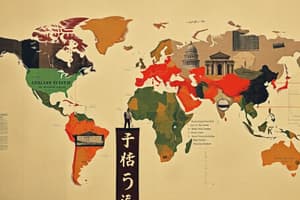Podcast
Questions and Answers
Which of the following is part of the four elements of state?
Which of the following is part of the four elements of state?
- Territory (correct)
- People (correct)
- Infrastructure
- Economy
What is the Global Interstate System?
What is the Global Interstate System?
A system of interactions and relations among states in the world that involves competing powers.
All states have control over their internal and foreign affairs.
All states have control over their internal and foreign affairs.
True (A)
The __________ are the lawmakers in a state.
The __________ are the lawmakers in a state.
Match the branches of government with their roles:
Match the branches of government with their roles:
What is the definition of 'Global' in the context of the Global Interstate System?
What is the definition of 'Global' in the context of the Global Interstate System?
What does 'Interstate' refer to in the Global Interstate System?
What does 'Interstate' refer to in the Global Interstate System?
What is meant by 'System' in the context of the Global Interstate System?
What is meant by 'System' in the context of the Global Interstate System?
What are the four elements of a state?
What are the four elements of a state?
What is the role of 'People' in a state?
What is the role of 'People' in a state?
What does 'Territory' mean in terms of a state?
What does 'Territory' mean in terms of a state?
What is the function of 'Government' within a state?
What is the function of 'Government' within a state?
Which branch of government is responsible for making laws?
Which branch of government is responsible for making laws?
Who are the main figures in the Executive branch of government?
Who are the main figures in the Executive branch of government?
What does 'Sovereignty' refer to in the context of a state?
What does 'Sovereignty' refer to in the context of a state?
Flashcards are hidden until you start studying
Study Notes
The Global Interstate System: Concepts and Principles
- Globalization refers to processes that encompass the entire world, influencing interactions and relations among states.
- An interstate system comprises a dynamic framework where states interact, negotiate, and compete for power.
- States within this system lack a single dominant power, leading to continuous shifts in alliances and balance of power.
- The challenge of power imbalances often results in changing alliances and geopolitical tensions.
A. State-Government Concept
- Four fundamental elements define a state, including both physical and political bases.
Physical Bases
- People: A permanent population is essential, as citizens embody the state and participate in governance.
- Territory: States occupy specific geographical areas, delineating their jurisdiction and control.
Political Bases
- Government: A political structure is fundamental for ruling and organizing the state effectively.
Branches of Government
- Legislative: Responsible for creating laws; includes entities such as the Senate and House of Representatives (e.g., Philippines Congress).
- Executive: Comprises the President and Vice President, who are elected by the populace and serve a six-year term, along with their advisory Cabinet.
- Judicial: Encompasses the Supreme Court and other federal courts, ensuring laws are interpreted and justice is administered.
- Sovereignty: Each state maintains sovereignty, allowing it to govern its internal and external affairs independently, with its own authority.
The Global Interstate System
- Encompasses a network of competing and unequal states unable to fully dominate one another.
- Characterized by dynamic interactions, including shifting alliances and conflicts.
- Changes in state power lead to realignments in global power structures.
Elements of the State-Government Concept
- Defined by both physical and political bases that establish its existence and function.
Physical Bases
- People: Permanent population that forms the foundation of the state.
- Territory: Defined geographical area occupied by the state's population.
Political Bases
-
Government: Entity that governs and enforces rules over the population.
- Legislative Branch: Composed of lawmakers such as the Senate and House of Representatives in the Philippines.
- Executive Branch: Led by an elected President and Vice President, supported by Cabinet members.
- Judicial Branch: Includes the Supreme Court and other federal courts to interpret laws.
-
Sovereignty: The state's autonomy in managing its internal and external affairs, ensuring independence from other states.
Studying That Suits You
Use AI to generate personalized quizzes and flashcards to suit your learning preferences.




